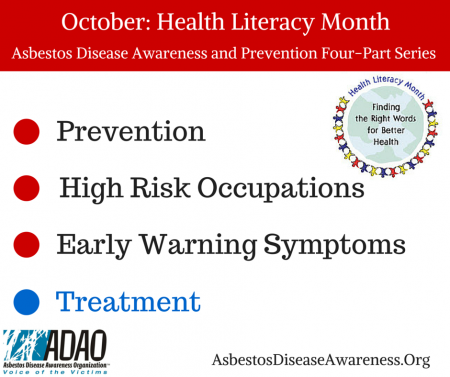Posted on October 24, 2016
Health Literacy Month Landing Page
Part One: Prevent Asbestos Exposure
Part Two: Recognize High Risk Occupations
Part Three: Understand the Warning Symptoms for Asbestos-Caused Diseases
Part Four: Finding a Center of Excellence for Treatment
Important Notice: ADAO does not make medical diagnoses, recommend treatment, or answer specific patient questions. Specific concerns should be addressed directly by your physician.
It’s Health Literacy Month, and at the Asbestos Disease Awareness Organization (ADAO), that means saving lives through raising awareness. Everyone should know the “Irrefutable Facts” about how to protect your loved ones from asbestos exposure because the only two ways to end asbestos-caused diseases are prevention and a cure. Asbestos is still legal and lethal in the U.S., and you may have it in your home, school, or office.
In Parts 1-3 of our monthlong Health Literacy series, we blogged about prevention methods, how to recognize high risk occupations, and how to understand the warning symptoms for asbestos-caused diseases. This week, we highlight how you and your loved ones can find the proper medical treatment should you be exposed to asbestos and subsequently contract an asbestos-related disease. Please take a few moments today to read the important facts below, then “be a health literacy hero,” and share this blog with your social networks.
As we wrote in part three of our blog series, symptoms of asbestos diseases after exposure can take decades to detect. Once they are detected, the National Cancer Institute (NIH) recommends individuals seek out a detailed physical examination, including a chest x-ray and lung function tests. While chest x-rays are reportedly the most common tool used in detecting asbestos-related diseases, they do not detect the actual fibers in the lungs—only early signs of lung diseases. For this reason, studies like those done by the Agency for Toxic Substances and Disease Registry, indicate that patients should elect to seek out other methods of medical detection like computed tomography (CT) scans or surgical procedures like a lung biopsy or a bronchoscopy.
Being told that you or a loved one has an asbestos-related disease can often bring about an overwhelming feeling of isolation and grief. Many of us can vividly remember the heartbreaking moment when we heard the diagnosis. But you are far from alone. ADAO is a community comprised of people who have gone through similar experiences and can offer their help.
“Mesothelioma – can’t pronounce it, can’t cure it,” was my devastated, personal reaction after learning of my husbands diagnosis. It took me many weeks to even begin to understand the diagnosis my husband had received and identify the very limited treatment options available to him. My learning curve was steep and Alan was diagnosed before the advancement of the smart phone with its convenience and learning power.
Navigating the health care system maze is complex – but it shouldn’t be. ADAO is committed to replacing those feelings of fear, loneliness, and confusion with the knowledge that there are others who share your experience and want to support you. ADAO has compiled a list of treatment centers specializing in mesothelioma and asbestos-related diseases, in hopes of providing easy access to information about medical resources.
ADAO encourages individuals to consult a range of sources to find the medical practitioner that best suits their needs for treatment. The National Cancer Institute is an excellent source, providing information on clinical trials and materials in both English and Spanish to answer your questions on “How to Find a Doctor or Treatment Facility if you Have Cancer.” Additionally, the Penn Mesothelioma and Pleural Program, International Mesothelioma Program, the Center for Asbestos Related Diseases (CARD) in Libby, Montana, Mesothelioma Applied Research Foundation (MARF), the Cancer Support Community, Caring Bridge, Cancer Survivor Toolbox and the Association of Cancer Online Resources, Inc. (ACOR) have information about treatment and support.
I sincerely hope that patients and families impacted by asbestos exposure will find this medical resource page beneficial as a guide in finding a doctor, getting a second opinion, and choosing the best treatment facility.
As we say at ADAO, “Hear Asbestos. Think Prevention.”
In support,
Linda Reinstein
